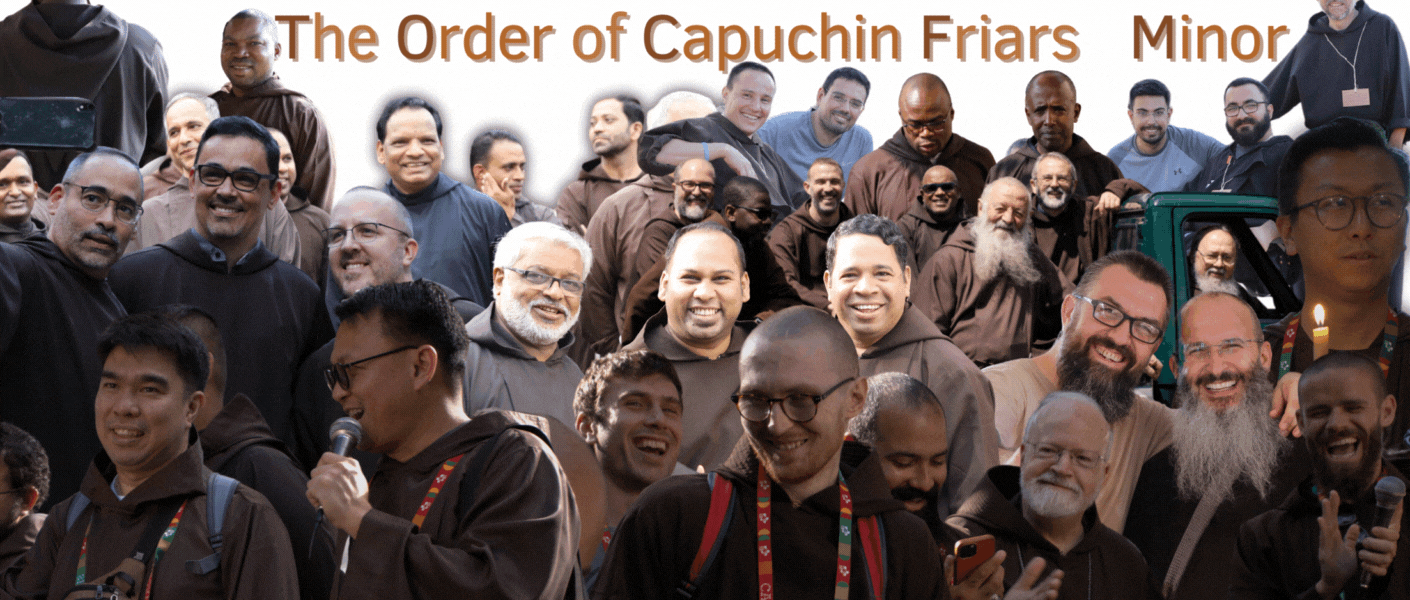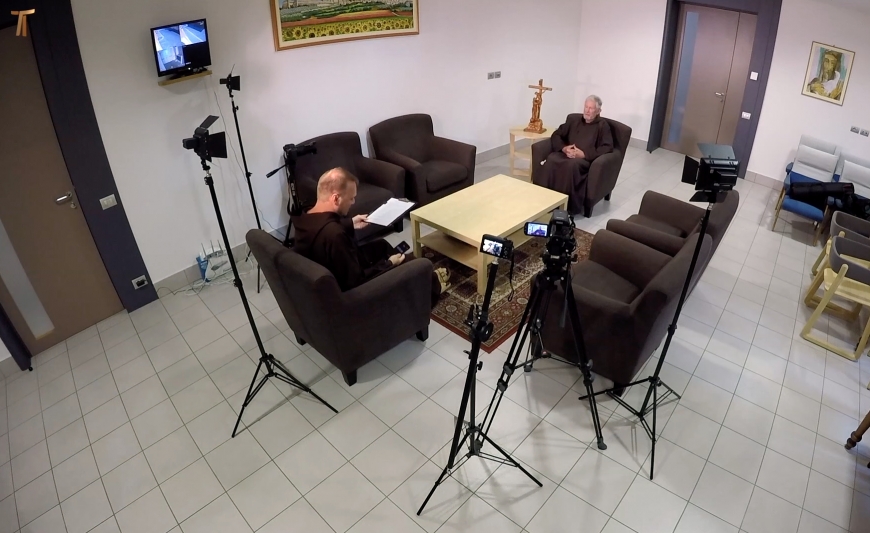Face to face with Br. Mauro Jöhri as he finishes his term
- Published in Other news items
We met with our brother, the outgoing General Minister, and asked some questions on the twelve years (2006-2018) he has spent guiding the Capuchin Order. In the following video you can hear his replies, impressions, and evaluation of the state of the Order, as well as appreciate where his heart is as the moment to entrust this service to his successor approaches.
Watch the video interview - https://youtu.be/jt_9DSQGT40
Interview with the general minister, Br Mauro Jöhri, OFMCap
Pawel: Peace and all good. We are here in Rome, in the General Curia of the Capuchin Friars Minor. There are about 10,140 Capuchin friars located throughout the world. Someone who has come to know this large reality very well during his past 12 years of service is the general minister, Br Mauro Jöhri. Br Mauro was initially elected in 2006 and re-elected in 2012. First of all, greetings of peace and good, Br Mauro.
Mauro: Peace and good to my interviewer and warm greetings to all the brothers who are following us, and who will listen to this and will follow the upcoming events.
Pawel: The general chapter will begin soon. Let's go back to 2006, to when you were first elected as general minister of the Order. Br. Mauro, before being elected as minister what was your ministry in the province?
Mauro: At the time, I was the provincial minister. I had been nominated 6 months earlier, when the former provincial minister of Switzerland, Thomas Egger, had to step down for reasons of health. John Corriveau, who was general minister at that time, called to tell me that he had named me as provincial minister, and as provincial minister I participated in the general chapter, when I became "stuck" in Rome.
Pawel: What does it mean to be the general minister? What is it like?
Mauro: I think the word "minister" says it well. It means to be of service. It is a service that is certainly very demanding because, on the one hand, you are the representative, the successor of St Francis, and this is something close to impossible. On the other hand, you are a brother, an older brother, so to speak, who walks alongside the brothers and who is involved in many situations in the Order. One who is present where there is growth, as well as where there is diminishment. At times you must lead. At times you must foster a certain level of spirituality, and a higher, more generous level of pastoral engagement. I would say it is a service that is quite complex, but also a fundamentally beautiful service.
Pawel: In the past 12 years, what was your most interesting experience?
Mauro: It is not enough to speak of one because there were certainly many. But if I had to put them together, I would say it was when I met friars who worked well together, but who also prayed and lived together. That is, it was the fact of having an integrated life, of being able to relate to people and to truly go where no one else wants to go - to take a risk and to take on the task of doing something that requires more than you think you are capable of doing, and to nourish this giving of self in prayer and in fraternal life. I saw many examples of this, and they were easily the most beautiful experiences. To see a friar who succeeds, but not in the sense that all his needs were met, but that the needs of our charism were fulfilled.
Pawel: Can you give us an example?
Mauro: The best example for me was when I was in Iceland, and I saw how our Slovak brothers are working with immigrants, and how they assumed the responsibility of a parish that is spread out over 700 kilometers of coastline with 700 Catholics. When I saw how close they were to these workers, especially the Poles who went to that island and are working and making sacrifices for their families. Another wonderful experience was my visit to Capo Verde, where Br. Silvino, after working patiently, succeeded in bringing reconciliation to an area of the city where there had been many murders. I have often experienced many other situations such as these.
Pawel: What were the most difficult moments for you, the greatest challenges?
Mauro: Without a doubt, the most difficult thing I faced was the recognition that even among us there were brothers who had abused minors, and I had to confront these situations. Having to conduct investigations in order to discover the truth. Making efforts to foster the protection of minors, to promote an awareness that children should not be harmed, not just in a physical sense, but also in the way we look at them, trying to create a climate that allows people to grow in a healthy way, and in which they are profoundly respected. Certainly, there were other situations when friars were pitted against friars, especially in public, that were not very enjoyable, but that needed to be confronted.
Pawel: What are the strengths and weaknesses of the worldwide Capuchin Order?
Mauro: First of all, before being changed, my view was greatly expanded. I had the chance to go almost everywhere and to visit almost all the Order's circumscriptions with the exception of a few of the smaller ones. I was able to get acquainted, therefore, with the Order. I also came to realize how much the Order is affected by culture, that is, how each country, and each continent has its way of seeing things. To enter into, to succeed in understanding, to respect and understand what they were experiencing, and how they lived. My view of the Order, therefore, has changed, in the sense that it is much more complex. At the same time, I believe I can also say that the Order, despite these complexities and diversities, is united, and in my view, this is one of the most important factors. And for this service of unity, it was very important for me to have councilors because without councilors, it would be impossible to maintain close ties, to reach out, to make known - how can I say - our presence as a General Curia that accompanies, that is in touch with situations. Therefore, the Order for me today is much more complex and I have come to know it from various angles. I see the fragility of the Order, but it is not the type of fragility that condemns us, but that must be accepted. Overall, the Order seems to be healthy to me.
Pawel: How has your vision of the Order changed in these past 12 years?
Mauro: Certainly, one of the best, most important aspects of the Order is our closeness to people, that is, being brothers of the people, who go to difficult, far-off, remote places - this closeness to the people, the simplicity with which we relate to them. I also believe our living in fraternity is a school - even though most often we are unaware of it - it is a school that forges us and enables us to form relationships. This is a very beautiful aspect of the Order. Looking instead at the difficulties or the challenges, in my opinion we need to strengthen the spiritual dimension of our life. We have to grow in faithfulness to mental prayer, to times of prayer. We truly need to grow in our ability to stand before God and to see the world with his eyes, with the eyes of compassion, with an even greater closeness to the poor and humble. This is a challenge for the whole Order.
Pawel: What message would you, as general minister, like to send to your friars, and what do you wish for the next general minister?
Mauro: To the friars, above all I would like to say a word of thanks to those who welcomed me and who worked with me. I know that many assured me of their prayers, and this was fundamental - the support of the friars' prayers, their kindness, their friendship. My wish for the friars is that each of them might discover the beauty of the charism that Francis left us, becoming a follower of Jesus of Nazareth, Jesus Christ. It is not possible to separate Francis from the Gospel or from the person of Jesus. Therefore, to discover the beauty of the charism and not to be satisfied with having reached a certain point because our journey is a journey of growth. Every age has its challenges and its good points, but we should not stop moving. Therefore, my wish is that they continue to learn, to discover, to plumb, I would say, the depths of our charism in order to live it to the full. That is my wish for the friars. For my successor, I wish good health because the travel and the work require good health; it requires not holding anything back. I also hope that he can remain composed, in the sense of not allowing situations to get to him, especially the most difficult ones. I hope that he truly receives the gift of counsel, that is, in the sense of - he'll have a council that works with him - but also the gift of the Holy Spirit, to evaluate things, to make decisions that are, as far as possible, aligned with the facts. I wish that when he encounters a difficult situation that he might always listen to all sides of the story because otherwise it is very easy to trip up and become unjust, to go "à côté", as they say in French, of the facts. These things then: health, composure, as well as something that is very difficult, but very important - that he learn to take time for himself, time to pray, but also time to rest, time to renew his energy, perhaps by doing some physical exercise. That never hurts; in fact, I would say that it does one good and that the general minister should, like a mountain guide, give an example by doing first that which he asks of others.
Pawel: Thank you, Br Mauro, for this interview, and thanks for your service during the last 12 years. We wish the Lord's blessing on you. Peace and all good.
Mauro: Heartfelt thanks to all of you and heartfelt thanks especially to God, who has been by my side during all these years.


